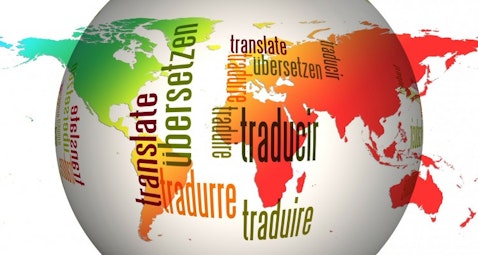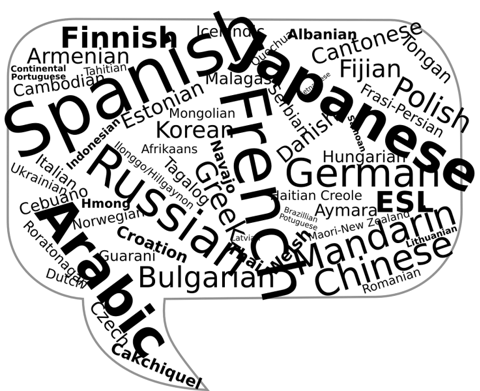What are the easiest Germanic languages to learn for English speakers?
Not every language is equally easy or equally hard to learn. How fast will a person acquire a new language definitely depends on numerous factors, and among those factors is their native language as one of the crucial points. If you are interested in learning another language, besides English as your mother tongue, check out our list of 5 Easiest Second Languages to Learn for English speakers.

Copyright: kbuntu / 123RF Stock Photo
The English language is known as lingua franca, that is, the language used globally in connecting people and making their communication easier. It belongs to the Indo-European family of languages and is a West Germanic language. However, even though we live in the world where you can find someone speaking English almost everywhere, it is still not enough to speak only English and everyone should learn at least one more language. Remember, it helps your brain cells develop faster and you become smarter by learning an additional language! There are many interesting facts about this language. As someone who has a degree in English literature, the most amazing thing for me is actually Shakespeare’s contribution to this language. According to one BBC article, he influenced the language as we know it today, and it has been estimated that, out of 15,000 words that he used in his plays, he invented almost half of them combining the words from other languages and merging them into completely new ones. So, if you are a fresh English learner, and you can’t remember certain words, blame it on Shakespeare!
To go back to the point, it is never easy to make the list of the easiest languages to learn for certain speakers, since many factors are involved in this issue. On the other side, there are many services and research that deal with this, so I tried hard to find the most relevant ones. Fortunately, there is the language difficulty ranking provided by the Foreign Service Institute, and it does not include only Germanic languages, although I managed to single them out and include them in the list. All of the languages are divided into five categories, and the languages within the first category are considered to be the easiest to learn, while the ones in the fifth category are exceptionally difficult for English speakers, as estimated by the Institute.
Let’s learn more about the easiest Germanic languages to learn for English speakers.
7. Icelandic
Although it has only around 350,000 speakers in the world, that is, 0.005% of the people on the planet speak Icelandic, this language is still very much interesting and easy to learn for English speakers. It belongs to a subgroup of North Germanic languages, and according to the Foreign Service Institute, it is in the fourth category of languages, estimating that an English speaker will need around 44 weeks or 1100 hours to learn and speak it fluently.

gpointstudio/Shutterstock.com
6. German
German, the number six on our list of easiest Germanic languages to learn for English speakers is the only language in the second category of languages that are considered to be similar to English, and it is estimated that it can be learned for 30 weeks, that is, 750 hours. It belongs to ten most popular languages in the world, being the additional reason to make a decision and learn it. It is spoken by around 120 million people, and it is becoming more and more popular due to job and studying opportunities that this country offers.

Copyright: vadymvdrobot / 123RF Stock Photo
5. Norwegian
This Scandinavian language is in the first category of languages that are considered to be closely related to English, with the estimation that it can be learned for 23-24 weeks, that is, 575-600 hours. Syntax and word order in Norwegian are quite similar to English, and considering the fact the language is spoken by around 4 millions of people located mainly in Norway, you should consider learning this language if you have a certain interest in moving there. Now, let’s see the top four entries on our list of easiest Germanic languages to learn for English speakers.

4. Afrikaans
This is not a very famous language, considering the fact it is only spoken in some African countries, such as Namibia and South Africa. However, that is not the reason not to try and learn it, since it is estimated that it can be learned for, 23-24 weeks, that is, 575-600 hours, being in the first category. Some of the words are quite similar to English, and for me, the most appealing was the fact that Nadine Gordimer, a writer, political activist and Nobel Prize winner spoke it. Considering the number of hours it requires, Afrikaans is the fourth easiest Germanic language to learn for English speakers.

3. Danish
This Germanic language is the official language of Denmark, and it is spoken by around 5 million of people in the world, who are usually settled in Greenland and the Faeroe Islands besides Denmark. Although it is very rich in vowels that are completely unfamiliar to English speakers, such as æ, ø and å, it is still very similar regarding the vocabulary and grammatical rules, so it is also estimated that it can be learned in 23-24 weeks, that is, 575-600 hours.

2. Dutch
In simple words, it has been said that Dutch, the next one on our list of easiest Germanic languages to learn for English speakers is the language which is somewhere in between German and English and that it also shares many cognates with English. For example, it will be quite easy to understand when someone says appel, banaan or tomaat, since it is basically the same. This language can also be learned for about 23-24 weeks, that is, 575-600 hours, so think about this option!

romantitov/Shutterstock.com
1. Swedish
This language is the official language in Sweden, as well as in some parts of Finland, and it is spoken by around 9 million people in the world. According to the Foreign Service Institute, it can be learned in about 23-24 weeks, or 575-600 hours, and it is very similar to English regarding the word order and verb conjugation. It also has many words that have the same linguistic derivation as English, being the reason it is first on the list of easiest Germanic languages to learn for English speakers.






